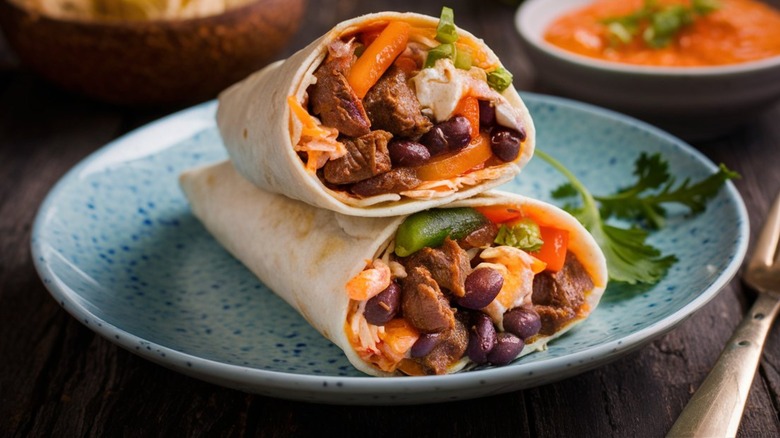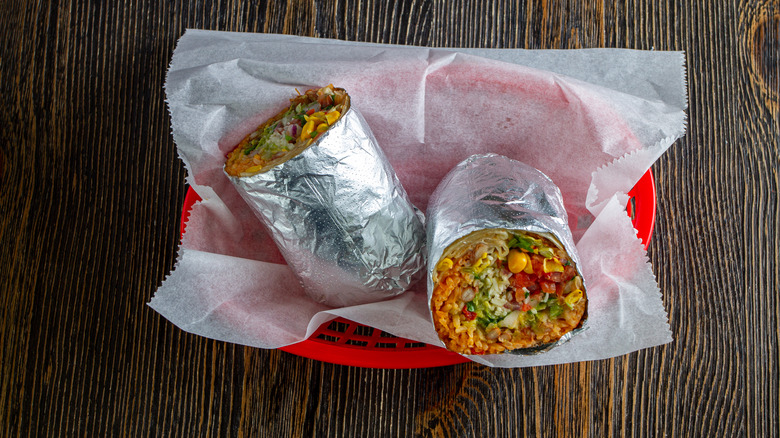Is A Burrito Considered A Sandwich Or A Wrap?
If you've spent any time on the internet, you've most likely stumbled across a heated debate about how we classify food. Is cereal soup? Is a hot dog a sandwich? Is ketchup a smoothie? Yes, that last one is real. And for the record — no, it's not. These are the kind of hard-hitting questions that keep you up at night. But one such debate has risen to prominence in the last few years, and it might be the most maddening of all: Is a burrito a sandwich or a wrap?
The debate stems from the fact that nobody seems to agree on what a sandwich actually is. The Oxford English Dictionary defines it as "an item of food consisting of two pieces of bread with a filling between them, eaten as a light meal" (that last part having traditionally excluded hamburgers from sandwich status). Merriam-Webster agrees — with the caveat of also including "one slice of bread covered with food." That doesn't make any sense at all — does an open-faced sandwich qualify? Or is it something different entirely?
Since the N.Y. State Department of Taxation and Finance decided unequivocally that a burrito is, in fact, a sandwich (or at least that all wraps are sandwiches for tax purposes), the internet has been ablaze. So before any more friendships are ended, it's about time someone settled it once and for all. Is a burrito a sandwich or a wrap? The answer seems obvious: it's both.
The definition of a burrito legally varies from state to state
The debate isn't just limited to the realms of internet tin-foil-hattery. There's legal precedent here — and even the justice system can't make up its mind. In 2006, a judge ruled that, categorically, a burrito is not a sandwich ... in the state of Massachusetts. This ruling came after Panera attempted to block the opening of a nearby Qdoba, a fast-casual Mexican restaurant. In essence, Panera's aim was to legally classify the burritos Qdoba sold as sandwiches, to prevent Qdoba from opening based on a non-compete claim. Panera failed. But had it succeeded, the precedent could have had vast ramifications, leaving restaurants suddenly vulnerable to a barrage of lawsuits — with independent businesses likely to suffer the most.
In 2024, however, an Indiana judge ruled the opposite — specifically that burritos and tacos are, in fact, "Mexican-style sandwiches" (via Library of Congress Blog). In that case, a restaurateur had petitioned that his Mexican restaurant fell under the purview of a sandwich shop — a ruling which, had it gone the other way, would have prevented him from opening entirely, forcing him to relocate the shop.
So it looks like the burrito's identity might be defined less by what it is, and more by where you eat it — and this debate goes an awful lot further than just rowdy comment sections.
How a burrito is classified affects its price and availability
You might have seen this one coming. Sadly, there is no definitive answer as to whether a burrito is a sandwich or a wrap. There most likely never will be. The burrito certainly deserves its place in culinary history, out of the shadow of the sandwich. But, going by conventional wisdom, it likely qualifies as a member of that particular classification. It is both a sandwich and a wrap; it just depends on who you ask and — perhaps more importantly — where.
That doesn't really get at the core of what's important here, though. Sure, food debates are a fun way to waste time when we should probably be working. Whether a wet or regular burrito qualifies as a sandwich is a question to throw out randomly at a dinner party if you fancy causing some chaos. But these culinary debates also have very real implications. They've been a legal flashpoint, a convenient nebulosity that's allowed both huge corporations and individual restaurateurs to try and get a leg up. And it affects both of their bottom lines — which affects you. So, despite the triviality of the question, all this has the potential to impact how much your burrito is costing you — or whether you'll even be able to buy it at all.



